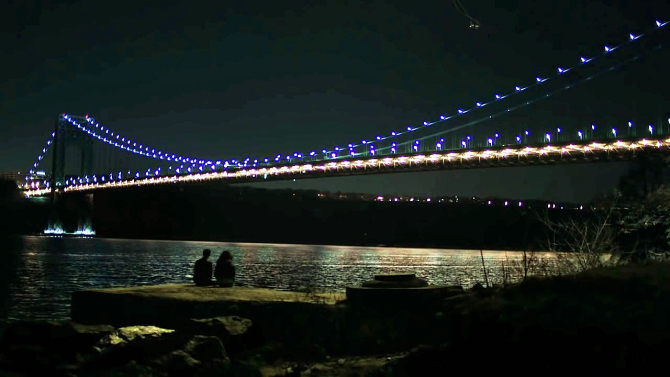| Most great television shows have a secret: the general premise is simply a front, a mirage. In The Revolution was Televised, Alan Sepinwall writes about David Chase, creator of the hit HBO series The Sopranos. Chase didn’t set out to write a mob drama. He set out to write a show about his troubled relationship with his late mother. […] He just wanted to find a way to make the stakes high enough that viewers would care. |  TheCroakingFrog says: See It What Hopped: visual design; lead performances; patient, emotion-based storytelling What Croaked: a persistent, sometimes arrogant disinterest in the staples of crime-based television Recommendation Key: See It Now: see ASAP See It: see if you have time Skip It: see at your own risk Forget It: avoid at all costs |
Naturally, then, The Night Of — HBO’s latest, limited series about a young man accused of murder — isn’t really a murder mystery. Instead, it’s a critique of America’s criminal justice system, complete with a prison parable (inmate Freddy vs. the system) and a medical metaphor (lawyer John Stone’s eczema as a symbol of the system’s flaws).
Confident in its ultimate mission, The Night Of skips right past the detective drama facade straight to its deeper message. Why bother with the trappings of a standard police procedural — like believable suspects, fair clues and smart interrogations — when you’ve got the deeper, more profound part nailed?
Unfortunately, this decision almost ruins the show.
The Night Of’s biggest mistake is that it forgets the facade still matters. The series is convinced it’s better than Law & Order, and it’s this arrogance that prevents the series from achieving true greatness.
Contrast this attitude with Breaking Bad's. Even if Vince Gilligan’s masterpiece wasn’t ultimately about cooking meth, you’d be excused for thinking otherwise. Between the series’ clear reverence for chemistry and its gorgeous laboratory montages — always set to the perfect song — the AMC classic cared deeply about its form, its mechanics, its surface-level subject matter.
Conversely, The Night Of is largely disinterested in its own puzzle. Instead of asking "Who killed Andrea Cornish?” The Night Of asks, “Who cares?” Instead of questioning why the crime was committed, how it happened, or when it took place, The Night Of wonders why a man with a cat allergy would so desperately want to take care of a cat. It’s all very poetic and high-minded. It’s also frustrating and disappointing.
I wouldn’t care so much about this particular shortcoming if the show weren’t exceptional everywhere else. Start with the cinematography. From the opening credit sequence — where the rigid gridlines of the road mirror the sterility of prison bars — to the slow, close, uncomfortable pace with which the camera tracks Naz in and out of prison, the visual design is stunning. I’d rank it alongside Mad Men and Breaking Bad for its sheer beauty and meticulousness.
John Turturro delivers the best performance of all in Jack Stone, the scraggly attorney whose smarmy subway ads obscure a heart for the dejected and defenseless. At the risk of becoming a caricature, Turturro’s performance battles its way to something greater, something complicated, even profound. Like Han Solo or Severus Snape, he becomes the world’s most compelling, memorable character.
Finally, The Night Of shines in its emotional patience and maturity, particularly in the first three episodes. The series doesn’t need jump scares, cheap thrills or manufactured cliffhangers. Instead, it relies on slow, character-centric progression. Look to the protracted discovery of Naz’s knife or the gradual disintegration of Mr. Khan’s business partnership. Each plays out methodically, a series of intentional storytelling moments filled with hard, uncomfortable silences. When the officer eventually finds the knife — or when Mr. Khan is finally forced out of his own business — we feel it deep in our gut, even if we saw it coming five scenes before. This is handcrafted television at its best.
It’s just a shame The Night Of declines to bring the same intentionality to its murder mystery window dressings.
In its final two episodes, The Night Of turns — reluctantly — toward standard detective fare. At long last, we hear from the defense’s expert witness. We (finally) get some smart discussion of the crime scene and (for once) a few alternate theories of how things might have played out. With an hour to go, we even get a new, more promising suspect. (Don’t bother starting the series from the beginning to find a few early hints — they’re not there.)
Are the clues, red herrings and detective talk the most important part of the show? Not even close. But without them, the show becomes ungrounded — too philosophical and symbolic, too obsessed with achieving its own deeper message, too dependent on the abundance of art making up for the lack of logic.
Ultimately, I’m willing to acquit The Night Of for all the evidence in its favor. The characters, mood and visual design are simply too good not to recommend the series. If there winds up being a second season, I only hope the show starts caring as much about its viewer-friendly framework as its underlying message. After all, for a show to have a secret, it has to have something to hide it behind.



 RSS Feed
RSS Feed
